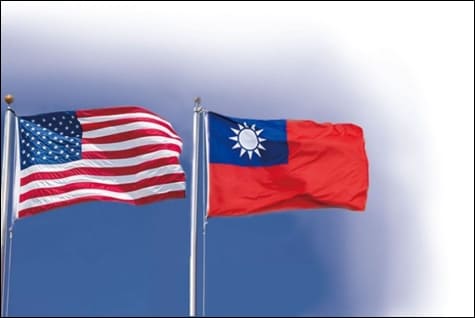Teng Jianqun, a researcher at the China Institute of International Studies, told the Chinese media outlet Capital News in an interview that China must remain 'highly vigilant' against what he referred to as the U.S.-Taiwan 'collusion.' Stressing that the U.S. does not have 'the final say' on China's 'national reunification, but Beijing does, he added: 'We will make our judgment based on the actual situations and push for the reunification according to the established plans of the great rejuvenation of the Chinese nation. We will never get sidetracked by some countries, including the U.S. Under the current circumstances, China has made its statements more clarified and clear-cut than before – i.e. that we have the capability and resolve to achieve our national reunification.'
Below are excerpts from his interview:[1]

(Source: Taiwannews.com.tw)
'The U.S. Hopes To Increase Its Supply Of Missiles To Taiwan'
Capital News: 'The supply of arms and military exercises are the focus of this year's dialogue. How do you view these 'Monterey Talks?''[2]
Teng Jianqun: 'The most important topic of the 'Monterey Talks' is arms sales, especially missiles transfers, followed by military exchanges.
'The administration of [Taiwanese President] Tsai Ing-wen has put forward some requests for weapons acquisitions, such as the 'Harpoon' anti-ship missile system that can hit the targets on the mainland and some projects for software upgrades. The United States also hopes to increase its supply of missiles to Taiwan. As it cannot directly send U.S. troops to Taiwan, the United States expects to use this format of arms sales to form a 'both offensive and defensive missile system' in the so-called 'first island chain.'
'The United States is pitching a 'hard sell,' but the Tsai Ing-wen authorities have no objection to it. Instead, in recent years, they have kept on actively initiating requests to ask for strengthening the establishment of a 'both offensive and defensive missile system' on the island. Recently, we have observed some changes at Jiu Peng Air Force Base in the southeastern corner of Taiwan: the hilltops have been levelled and its infrastructure is being expanded. We can tell that the Tsai Ing-wen authorities are making related preparations for such a system.
'In addition to it, another focus of the discussion by both sides is on the strengthening of military exchanges between the United States and Taiwan, such as sending American instructors to the island of Taiwan to conduct trainings.
'In fact, the exchanges between the defense personnel of the two sides have long existed. For example, the U.S. Special Forces once conducted special operations exercises on the island. Also, the frequency of transfers of Taiwan Air Force's F-16 fighter jets 'deployed' at the Luke Air Force Base in the U.S. state of Arizona has increased. We must remain highly vigilant against this kind of collusion between the United States and Taiwan.'
'U.S. Arms Sales To Taiwan Have Already Undergone A Qualitative Change'
Capital News: 'With this year's talks, are the weapons and the weapons systems provided by the U.S. to Taiwan seen as a transformation from the defensive nature to both offensive and defensive, or to the offensive?'
Teng Jianqun: 'The U.S. arms sales to Taiwan have already undergone a qualitative change, having evolved from the so-called 'defensive' nature in the past to the current 'both offensive and defensive.'
'First of all, the quantity of weapons sold by the United States to Taiwan has grown. And second, the restrictions on the quality of weapons have been gradually lifted. With the arms sales to Taiwan in the past, the United States often sold a lot of junks to earn protection fees. But nowadays, in terms of the types of arms sold to Taiwan, there are not only F-16V fighters to replace the F-16A, but also 'Sidewinder' air to air missiles. The modified and improved F-16Vs are good for not only air combat maneuvering (ACM) or dogfights, but also attacking ships and ground targets. Although Taiwan's missiles are small in sizes, they pose serious threats to surface warships.
'From the perspective of defense, the Tsai Ing-wen authorities plan to purchase 108 M1A2T Abrams main battle tanks starting in 2023. Although this type of tanks is in active duty in the U.S. Army, they are not very useful or helpful facing the terrains of the high and steep mountains and networks of water irrigation and patches of rice fields on the island of Taiwan. There were incidents of Taiwan's own 40-ton class tanks and armored vehicles falling off bridges or flipping into ditches.
'Then why does Taiwan still want to buy these M1A2T main battle tanks weighing 50 to 60 tons? They are actually the weapons and equipment forward-deployed and pre-positioned by the U.S. military. Once needed, they can be quickly transferred and mobilized to meet the U.S. demands in regional conflicts.
'At the same time, the U.S. military is also focusing on upgrading the software capabilities of Taiwan's weapon systems. At present, the data link and command/control system of the Taiwan military are basically the same as those of the U.S. military. American 'Pave Paws,' the long-range early warning radars, have long been installed at the Leshan radar station in the northwest of the island of Taiwan. They are capable of detecting and monitoring threats beyond 2,500 kilometers. During the Cold War, the United States used the 'Pave Paws' to deal with the ballistic missiles from the Soviet Union. But they are now for monitoring the mainland China.'
U.S. President Biden And Secretary Of State Blinken 'Are Saying One Thing, But Doing Another'
Capital News: 'How do the recent moves and petty acts by the United States on the Taiwan issue reflect the strategy of 'salami-slicing?''[3]
Teng Jianqun: 'In terms of legislations, the 'Taiwan Travel Act' passed by the U.S. Congress earlier allows members of Congress and some politicians to visit Taiwan. And many bills have been passed in the Congress and are still waiting to be approved by the government. The Taiwan issue has been turned into a so-called fortress for the 'strategic competition' between the United States and China.
'When it comes to the U.S. administration, although President Biden and Secretary of State Blinken have verbally reiterated repeatedly to abide by the one-China principle, they are in fact saying one thing, but doing another. They have completely violated all the commitments made by the U.S. since the establishment of diplomatic relations between China and the U.S. Since Biden came to the office, the U.S. military vessels and aircrafts have been passing through the Taiwan Strait almost every month. These provocative actions have imposed great challenges to the situation across the Taiwan Strait.
'Ever since the U.S. government put forward and advocated the 'Indo-Pacific Strategy,' the U.S. military has always been rushing to the forefront, trying to manufacture all kinds of gimmicks, so that all the various interest groups of the 'military-industrial complex' in the United States, such as the Department of Defense, the Congress, military industrial enterprises, scientific research entities, etc., can justifiably grab the wallets of the taxpayers.
'At the same time, the frequency of the military exercises conducted by the U.S. forces in the waters around the Taiwan area has been increasing. And they are far more extensive and targeted than those in the past. For example, they have conducted an exercise of 'carrier to carrier combat,' using our aircraft carrier battle group as the opposing force. Also, they have carried out joint military exercises with their allies.
'Biden's Comment During His Visit To Japan Was Not A Slip Of The Tongue'
Capital News: 'During his recent visit to Japan, Biden 'slipped his tongue' by saying that the United States would 'intervene militarily to protect Taiwan' if the mainland attempted to attack Taiwan. The official website of the U.S. State Department reinstated the wording that the country 'does not support Taiwan independence' after it had been removed. Is the U.S. policy of 'strategic ambiguity' on the Taiwan issue changing gradually?'
Teng Jianqun: 'Biden's comment during his visit to Japan was not a slip of the tongue, but sending a signal to the outside world, particularly to the Japanese government and the Tsai Ing-wen authorities, that the United States 'has the capability and is prepared to intervene in the Taiwan issue.' His purpose is to obstruct and impede China's reunification, try to 'use Taiwan to contain China,' and ensure the leadership and dominance of the United States in the Asia-Pacific region.
'But the United States also understands that its statements cannot be too explicit and blunt. So it hopes to maintain its current policy of 'ambiguity.' But the connotation of this 'policy of ambiguity' is no longer what it used to be originally.'
'We Will Never Get Sidetracked By Some Countries, Including the U. S.'
Capital News: 'China's Taiwan Affairs Office, the Ministry of Foreign Affairs and the Ministry of National Defense have all spoken out on many occasions, reaffirming their solid opposition to the official contact and military collusion between the United States and Taiwan in any form. What are the new characteristics of China's recent statements compared with the previous ones?'
Teng Jianqun: 'Based on my observations, some people have indeed been cooking up some scheme since the second half of last year, that is, some media outlets and think tanks in the United States have kept on playing up the mainland China's intension to 'unify Taiwan by force,' just like when the West continued to provoke and incite troubles prior to the outbreak of the Russian-Ukrainian conflict. Their goal is to trigger a real clash between the two sides across the strait, with the delusion that the mainland will get entrapped and bogged down in a predicament during its actions of 'reunifying Taiwan by force.'
'Without the national reunification, it is impossible to talk about our national rejuvenation. But as to when our reunification will be achieved, it is not the United States that has the final say, but China does. We will make our judgement based on the actual situations and push for the reunification according to the established plans of the great rejuvenation of the Chinese nation. We will never get sidetracked by some countries, including the United States.
'Under the current circumstances, China has made its statements more clarified and clear-cut than before – i.e. that we have the capability and resolve to achieve our national reunification.
'At the Shangri-La Dialogue held in Singapore not long ago, the Chinese State Councilor and Defense Minister Wei Fenghe made it loud and clear: peaceful reunification is the greatest aspiration of the Chinese people and China is willing to make all the efforts to realize our goals. But if anyone dares to secede Taiwan from China, we will not hesitate to fight and we will fight at all costs.'
[1] News.bjd.com.cn/2022/06/24/10108231.shtml, June 24, 2022.
[2] See also MEMRI Special Dispatch No. 10047, Chinese Media Outlet 'People's Daily' On U.S.-Taiwan 'Monterey' Security Talks: The U.S.'s Building Of Taiwanese 'Asymmetric Capability' Is 'Very Much Daydreaming For The Secessionist Forces On The Island,' June 29, 2022.




